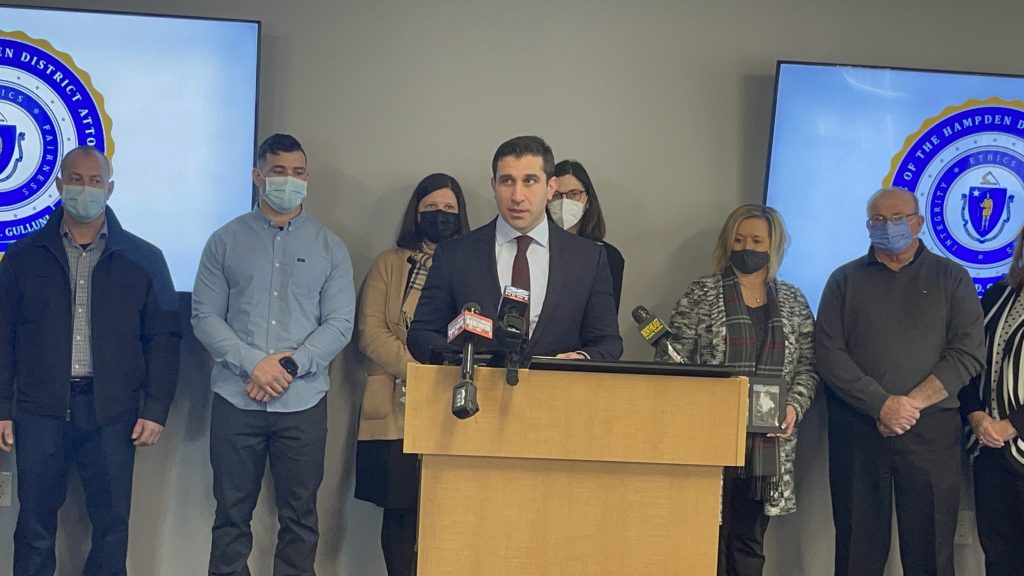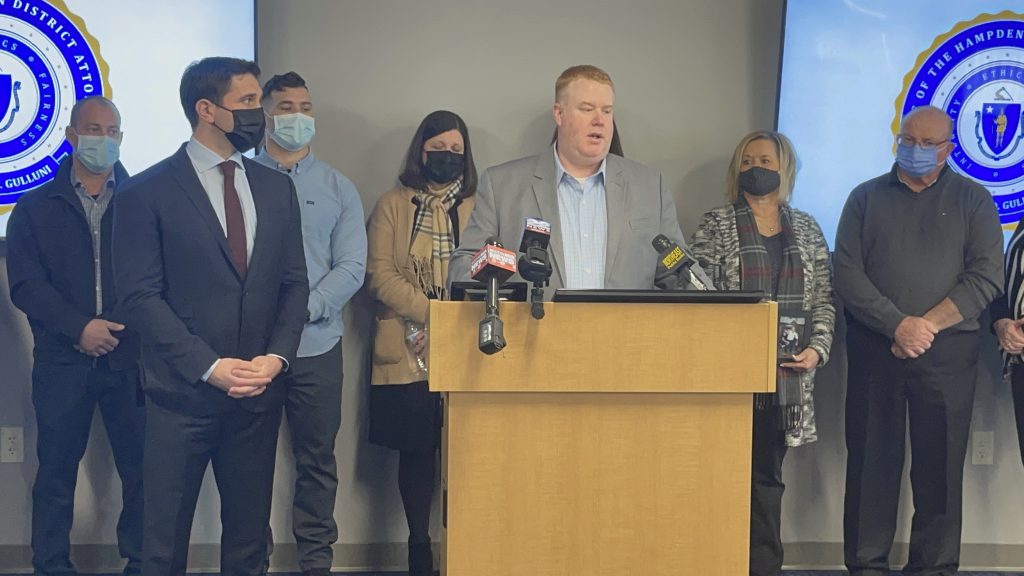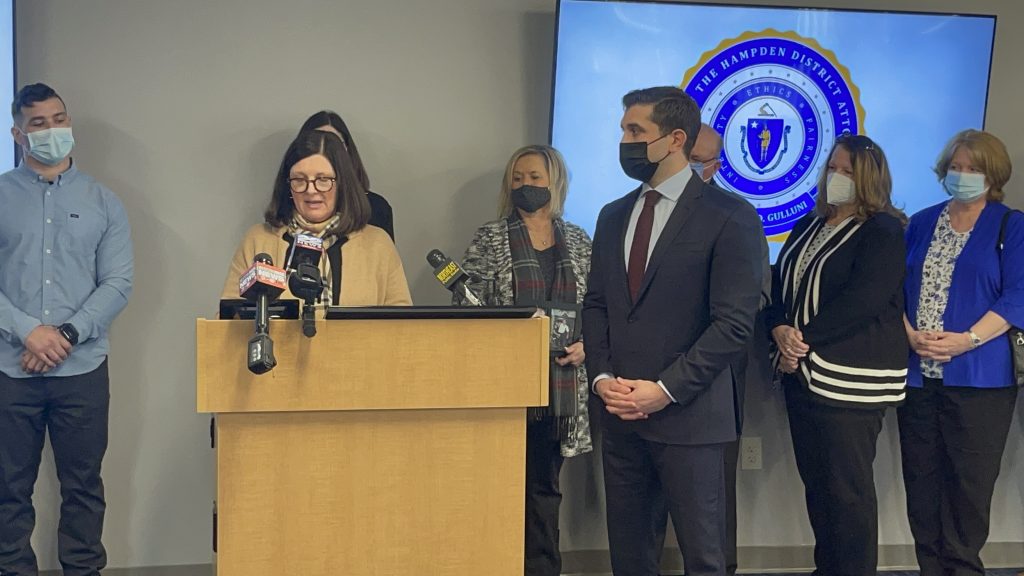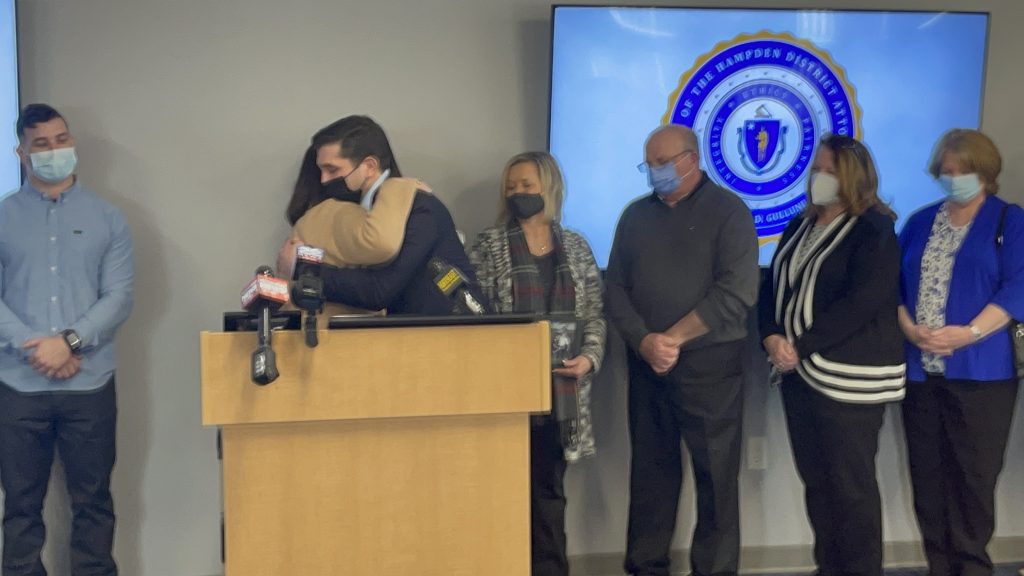Families of homicide victims call for change to medical parole loophole for murderers
February 10, 2022 -Springfield- Hampden District Attorney Anthony D. Gulluni held a press conference today in Springfield, calling for a review of the state’s medical parole statute. During the press conference D.A. Gulluni highlighted the law and the creation of it’s unintended consequences, when it established medical parole in 2018. The D.A. along with Maureen Regan and former State Senator James Welch, highlighted the issues the statute has created for surviving family members of murder victims. The press conference can be viewed in it’s entirety here: Medical Parole Press Conference.
In 2018, the Massachusetts State Legislature passed, and Governor Baker signed, a landmark criminal justice reform package. Contained within the law were many positive and constructive reforms and policy changes, including: greater accessibility for record expungement and sealing, more humane solitary confinement conditions, stronger opioid trafficking penalties, elimination of mandatory minimum sentences for many low-level drug offenses, and the increase of the minimum age of criminal responsibility from age 7 to 12
However, contained in the 2018 Criminal Justice Reform law, was the establishment of medical parole here in the Commonwealth (Ch. 127, S. 119A), which allows for the release of a prisoner due to “terminal illness” or “permanent incapacitation.” The statute directs, in the case of inmates in state prison, that this decision is made unilaterally by the Commissioner of the Department of Corrections. In turn, this places the Commissioner in the position to single-handedly void a sentence that was litigated and eventually rendered by a Superior Court judge, in most cases after years of litigation, a dissection of the evidence, and a plea or a jury’s conviction. This enormous responsibility can be carried out in mere days and, many times, without even a hearing on the facts of the incapacity or illness argued.
This law has come to apply to all sentenced inmates, including those serving life sentences for first degree murder convictions. The law does not apparently exclude, or otherwise distinguish, these inmates whose sentences represent the most serious punishment our laws allow, which explicitly preclude the possibility of parole. Those convicted of first degree murder have committed a most egregious act in the taking of another person’s life, with a specific intent to do so, under the laws of the Commonwealth, first degree murder, and only this charge, directs that these individuals are sentenced to life without the possibility of parole.
Hampden District Attorney Anthony Gulluni stated, “Although it may first appear that justice is rendered through the court system in cases ending with a conviction, families soon come to realize that the fight doesn’t end there, and that justice is not indelible. Soon thereafter, seemingly endless appeals and motions come like the seasons, year after year. Their fight for justice never ends, and the pain never subsides.”
Since changes to the state’s medical parole law went into effect, the Hampden District Attorney’s Office has been notified by the Massachusetts Department of Corrections of 45 petitions for medical parole. Of those 45 petitions nearly half, 21, of those petitions have been made by inmates convicted of murder. Some of the reasons cited for this early release, purportedly to establish a “permanent incapacitation”, have included: hypertension, the need for a wheelchair, pre-diabetes, insomnia, obesity, COVID-19, and back pain.
Today, District Attorney Gulluni, along with members of the Welch, Regan, and Brodeur families, highlighted three cases of their lost loved ones, and about how this process has affected them and their families, the cases are:
Anthony Olszewski: In January of 1982, Anthony Olszewski murdered 19 year old Joanne Welch. Olszewski committed the crime in a particularly heinous fashion, later telling friends that “she just wouldn’t die.” Joanne was a fighter, and managed to stay alive through his brutal assault, only succumbing after Olszewski left her in a remote location, in the middle of winter, where she died of exposure. Olszewski was convicted of first degree murder, which was later overturned by the SJC. His case was retried and he was convicted a second time of murder in the first degree. To this day, 40 years later, he continues to contrive post-conviction motions and appeals on both the state and federal levels. The Welch family has endured 40 years of Olszewski’s virtually relentless attempts to undo justice, and has applied for medical parole once in 2020 and again in 2021.
John Stote: John Stote brutally stabbed and killed John Regan in 1995. He was tried and convicted in 1997, and has since filed numerous post-conviction appeals, leading to dozens of motions and hearings. Through these court events over the past 25 years, his family has had to constantly re-live the tragic killing of their loved one every time they are notified of another motion being filed or hearing being held. Since 2020, he has made four petitions, two of them being granted, and he is currently on parole in a medical facility.
Joanne, Sliech-Brodeur: In 2004, Joanne Sliech-Brodeur, stabbed her husband, Joseph Brodeur, 34 times, fatally wounding him. She was convicted of first degree murder, which was then overturned on appeal. She eventually plead guilty to second degree murder and admitted to killing her husband. She has filed for three medical parole petitions, twice in 2020, and one 2021.
Hamdpen District Attorney Anthony Gulluni stated, “ What I, my staff, and my colleagues across the Commonwealth have experienced in our work with families of murder victims, is that the pain and trauma of their sudden and tragic loss is constant and enduring. This loss and its accompanying grief become their own life sentence. It is our contention that this law has created an unintended loophole that has given inmates convicted of first degree murder, who have been sentenced to life in prison without the possibility of parole, a means to pursue that very possibility of parole, and, in effect, to sidestep their lawful and due sentences and to circumvent the specific statutory punishment for this crime. Moreover, it causes undue, and unjust, occasions for families of lost loved ones to have to relive their trauma. Lawful and just murder sentences must have finality, after appropriate appeals. Accordingly, we encourage a review by our legislature and the governor to correct and amend this statute to maintain justice and decency for victims’ families and our communities.”





